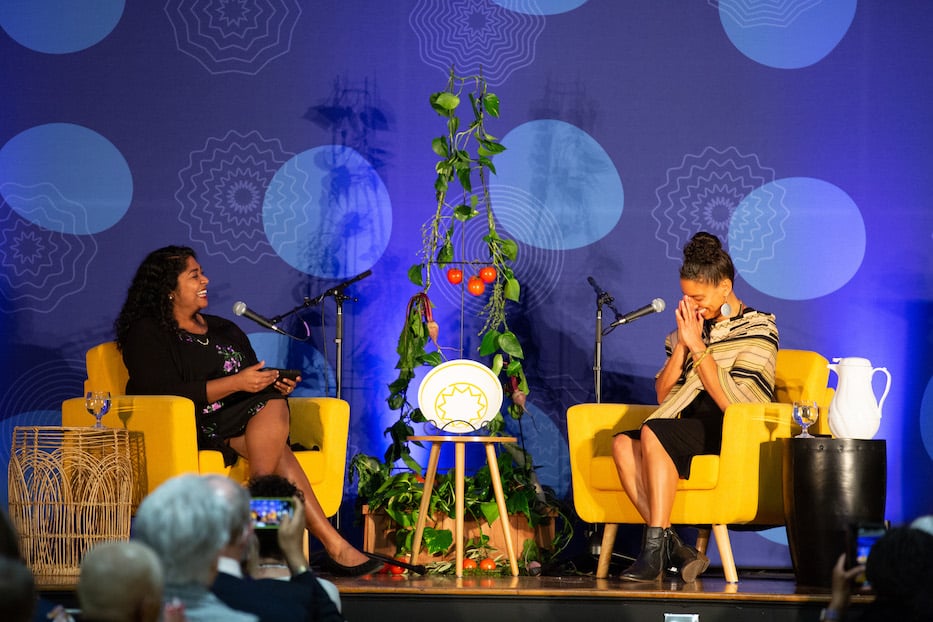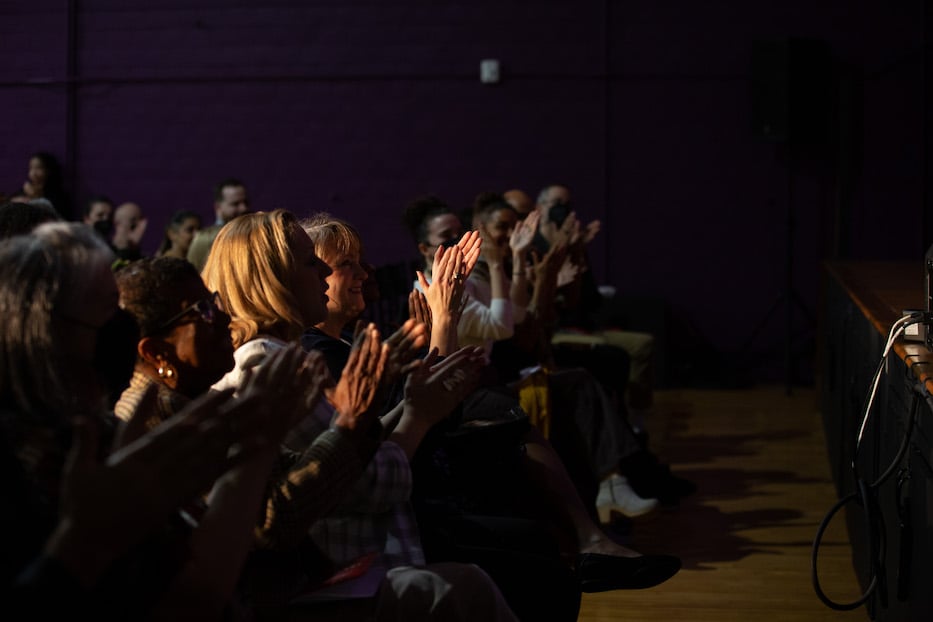
Lucy Nalpathanchil and Leah Penniman. Judy Sirota Rosenthal Photo.
Listen to the land—because it wants to heal itself, and heal those on it too. Look back to the farming practices that predated capitalism, including the very concept of land ownership. Work with an intentional community—because it's the only way forward in a world that has turned on its head.
That advice came from farmer, food justice activist, and self-proclaimed "soil nerd" Leah Penniman on a recent Thursday at the Lab at ConCORP, as she received the 2023 Visionary Leadership Award from the International Festival of Arts & Ideas. The author of Farming While Black and Black Earth Wisdom, Penniman is the co-executive director and farm director at Soul Fire Farm, where she has been cultivating the land for over a decade.
She is quick to say that she does not do the work alone: the Soul Fire Farm family now includes 15 staff members.
"The land called me first," she said in an awards-night conversation with Lucy Nalpathanchil, vice president of community engagement at CT Public. "There's no substitute for the intimacy of daily connection [with the land]. We fell in love, you know, with the wood sorrel and the blueberries and the rainbow trout and the sunsets."
Even as a kid, Penniman loved the earth, and saw that the earth could love her back. Growing up in rural Massachusetts, she was one of very few kids of color in her town, and often retreated to the woods for solace when she faced racism among and from her classmates. When she was six or seven, "I learned that the earth was in trouble," she said. She remembered feeling like alarm bells were going off in her body.
Upset and alarmed by the reality of climate change, she and her sister, Naima, created the two-person "Junior Ecologists' Kids Club," picking trash up as they biked through town. Penniman often watched as Naima, who she described as "much braver than I am," would place her body between trees and the loggers who sought to cut them down (Naima is now the director of education at Soul Fire Farm).
As a teenager, she began farming at The Food Project, a then-nascent initiative in urban farming and youth development run out of Boston. For her, the work made perfect sense in a world where little else did ("being a teenager is hard," she reminded the audience at the awards ceremony). She started working for the project every summer.
"The elegant simplicity of putting a seed in the ground, harvesting food, providing it to people who need it—no one can say that's not necessary," she said. "And so that became a way that I started to build a sense of worth."

Judy Sirota Rosenthal Photo.
It led to the tender roots of Soul Fire Farm, on which she has built a practice based in education, community, and Afro-Indigenous farming. When she was in her early 20s, Penniman and her partner, Jonah Vitale-Wolff, were parents to two very young children living in the South End of Albany. Their kids were young—two years and two weeks, Penniman remembered—and they wanted to be able to provide nourishing, fresh food. Penniman saw what she recognized as food apartheid, or a community deprived of accessible fresh food because its residents are poor.
"There was no grocery store. There was no farmers' market. I felt a little desperation to find vegetables to feed my children," she remembered. If she wanted to walk to a farm that offered a community supported agriculture (CSA) program, it was over two miles one way. Their neighbors kept asking them—mostly in jest—when they were going to start a farm. The suggestion stuck.
When the two purchased what is now Soul Fire Farm, it was "72 acres of really degraded, very affordable mountain land," she remembered. They built a home, working with mud, straw, and lumber that they sourced locally. They restored the soil. They spent years waking the earth back up, pulling their young children into the action. Then they opened in 2010, with a pro-rated "Solidarity Shares" program that is still running today. It gave the community access to fresh food that didn't exist anywhere else in the city—and didn't stop when their government benefits ran out.
"It is very important and meaningful to know that our work is making a difference," she said.
At Soul Fire, she said, the work is not just about feeding people—it's also about being able to imagine forward. She looked to the origins of the American food system as most people recognize it, which relied on theft of land, theft of people and practice of chattel slavery for over 200 years. Even after the end of the Civil War, the anti-Black laws known as Black Codes routinized the forced labor and continued economic disenfranchisement of Black people.
That discrimination still happens, she added: it was for years baked into the work of the U.S. Department of Agriculture, which has only recently started to reckon with its history of discrimination against Black, Brown, Indigenous, and women farmers.
But to those practices, Soul Fire Farm—and the places like it across the country—is both an antidote and a template. She noted how inspired she is by the legacy of Fannie Lou Hamer, who launched the Freedom Farm Cooperative in 1969 to support sharecroppers who had been kicked off their land after registering to vote.
"That legacy lives, right?" she said. "Through Soul Fire, through Shelterwood, through Catatumbo Co-Op, it lives through the work of [New Haven] farmer Dishaun [Harris] ."
"And so I feel very proud that even though the number of Black farmers dwindled to below one percent, that we're starting to see the slightest rise in the last census," she continued. "And that is very much this rising and returning generation that's saying, like, the land was the scene of the crime, but she wasn't the criminal. And we're coming. We're coming home."
Rev. Kevin Ewing, chair of the board of directors at the festival, said he was excited to recognize the impact of Penniman's work. He pointed to the festival's interest in both food and food justice, which in recent years has grown with speakers like Michael Twitty, Bryant Terry, and New Haveners Tagan Engel and Raven Blake.
“We are thrilled to be building on the strength of New Haven’s food justice commitment by shining a light on Penniman’s work," he said.
"We don’t often think about that fact that we can grow our own vegetables, our own food, and live off land that we live on and stand on every day,” chimed in Malakhi Eason, director of programming and community impact at the festival. "It's important to expose our community to leaders like Leah, [who] is someone who puts in the work to start changing the narrative of how we operate in life."
To hear the remainder of the interview, listen here.